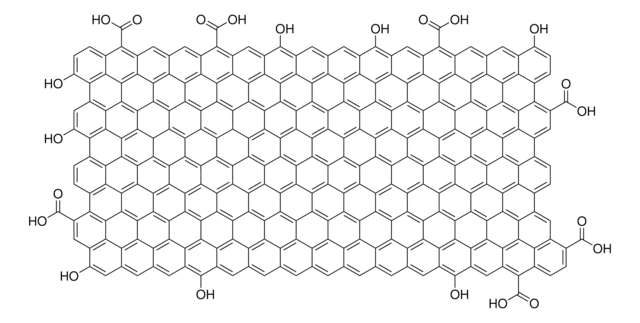333492
Titanium(IV) sulfide
powder, -200 mesh, 99.9%
Synonym(s):
Titanium disulfide
Sign Into View Organizational & Contract Pricing
All Photos(2)
About This Item
Linear Formula:
TiS2
CAS Number:
Molecular Weight:
112.00
EC Number:
MDL number:
UNSPSC Code:
12161600
PubChem Substance ID:
NACRES:
NA.22
Recommended Products
Quality Level
Assay
99.9%
form
powder
reaction suitability
core: titanium
reagent type: catalyst
particle size
-200 mesh
SMILES string
S=[Ti]=S
InChI
1S/2S.Ti
InChI key
CFJRPNFOLVDFMJ-UHFFFAOYSA-N
Looking for similar products? Visit Product Comparison Guide
Related Categories
General description
Titanium(IV)sulfide (TiS2) is a commercially available transition metal sulfide catalyst. TiS2 is classified as a transition metal dichalcogenide and used in rechargeable batteries as a cathode material.
Application
Titanium(IV)sulfide is used to analyze oxidation in various environmental conditions using advanced electron microscopy.
Signal Word
Warning
Hazard Statements
Precautionary Statements
Hazard Classifications
Eye Irrit. 2 - Self-heat. 2 - Skin Irrit. 2 - STOT SE 3
Target Organs
Respiratory system
Storage Class Code
4.2 - Pyrophoric and self-heating hazardous materials
WGK
WGK 3
Flash Point(F)
Not applicable
Flash Point(C)
Not applicable
Personal Protective Equipment
dust mask type N95 (US), Eyeshields, Gloves
Choose from one of the most recent versions:
Already Own This Product?
Find documentation for the products that you have recently purchased in the Document Library.
An in situ and ex situ TEM study into the oxidation of titanium (IV) sulphide
Long E, et al.
NPJ 2D materials and applications, 1(1), 1-9 (2017)
Growth of noble metal nanoparticles on single-layer TiS 2 and TaS 2 nanosheets for hydrogen evolution reaction
Zeng Z, et al.
Energy & Environmental Science, 797-803, 7(2)-7(2) (2014)
Sujay Prabakar et al.
Chemical communications (Cambridge, England), 47(1), 439-441 (2010-09-21)
The synthesis of inorganic fullerene (IF) nanoparticles and IF hollow spheres of titanium disulfide by a simple colloidal route is reported. The injection temperature of the titanium precursor into the solvent mixture was found to be important in controlling the
Ying Wen Linda Lim et al.
Nanoscale, 2(12), 2751-2757 (2010-10-13)
Titania (TiO2) and sodium titanate nanostructures with controllable phases and morphologies were synthesized by a hydrothermal method with titanium disulfide (TiS2) as the starting material. Sodium titanate nanobelts could be synthesized under a relatively low alkaline concentration (1 mol L(-1)
Andreea-Madalina Craiu
Oftalmologia (Bucharest, Romania : 1990), 53(2), 97-103 (2009-08-25)
The permanent colouring of disfigured corneal scars is known for almost 200 years. Because of improvement in surgical reconstructive techniques, corneal tattoing is used today only with a restricted group on carefully chosen patients, and merely for esthetique reasons.
Our team of scientists has experience in all areas of research including Life Science, Material Science, Chemical Synthesis, Chromatography, Analytical and many others.
Contact Technical Service








